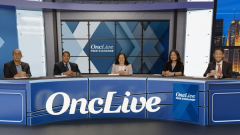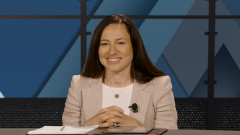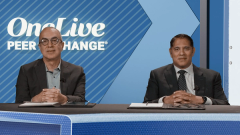
Systemic Treatment Armamentarium in Metastatic HSPC
Shared insight on the range of systemic therapy options available to patients who present with metastatic hormone-sensitive prostate cancer.
Episodes in this series

Transcript:
Rana McKay, MD:Risk stratifying is really important, but really why we risk stratify is to help better guide therapy, better guide expectations around the prognosis, and sort of that shared decision-making with patients. And maybe we can touch on how has the treatment landscape evolved in the mHSPC [metastatic hormone-sensitive prostate cancer] setting over the last decade.
Ulka Vaishampayan, MD:Yeah, it’s evolved quite a bit. All our castrate-resistant treatments are now being used in hormone-sensitive or castrate-sensitive disease. So the outcomes have improved because the sooner or earlier you treat with doublet and now triplet therapies, clearly you get that incremental survival benefit. The problem is that we have no good ways to pick and choose who gets what. To your point about the biomarker selection, we don’t have good biomarkers. So we have a number of biomarkers, but our clinical data has not quite caught up with them. As those two get together, and we get the information from the clinical outcomes of how we apply those biomarkers, that’ll be ideal to make those decisions. But as of now, I think the big incremental survival benefit that we are seeing with the addition to ADT [androgen deprivation therapy] of oral hormonal therapies and then adding chemotherapy is sort of becoming the standard of care.
Rana McKay, MD: Let’s start with what’s the role of doublets. What are the doublets now that are considered the standard of care? What role do they play in the mHSPC setting? Then we’ll talk about triplets.
Sumit K. Subudhi, MD, PhD:So the doublet combinations that are FDA-approved now are ADT plus abiraterone [Zytiga] alone, or ADT plus a second-generation androgen receptor antagonist such as enzalutamide [Xtandi] or apalutamide [Erleada]. That’s as far as doublets are concerned. And then in triplets, you can add ADT with darolutamide [Nubeqa] plus docetaxel or ADT plus abiraterone plus docetaxel. So those are your 2 triplet choices as well.
Rana McKay, MD:Do you all think that there’s any role for ADT plus docetaxel?
Scott Tagawa, MD, MS, FACP:Not for the average patient. I can imagine someone with only mets are in the liver, the PSA [prostate-specific antigen] presents very low. My experience tells me it’s not AR [androgen receptor] driven and really needs chemotherapy. Then maybe they also have some comorbidity for a second hormone agent. I can make up that situation that we all see once, but generally speaking, I think that that doublet is gone.
Rana McKay, MD:Yeah. I agree with you. ADT plus docetaxel is no longer a standard of care. I think in my clinic when I have patients before me, it’s ADT plus an ARSI [androgen receptor signaling inhibitor] and then who needs doce [docetaxel]? I’m asking the question of who needs to get doce [docetaxel] to the backbone of ADT plus an ARSI. How do you all select the ARSI? What are the things that factor into your decision-making around the choice of agent?
Arash Rezazadeh Kalebasty, MD:Well, I think we have to go by the trial inclusion-exclusion. For example, if we excluded patients with seizures in a trial like that patients of course shouldn’t get something that can cause seizures if they have a history of seizures. I think the history of falls is important. Their memory status is important. The cardiac mobility is important. Also, hypertension is another one that sometimes is a little bit difficult to make a decision on. But in the meantime, patients overweight with diabetes avoiding prednisone that could be another thing that I’m looking at it. History of heart failure, for example. It’s great that we have so many choices that sometimes you can say, “OK, if this patient cannot get this, at least [they] can get this one.” So there are similar, but there are some side effect differences that gives us the choice of getting one over the other one. But it is interesting that when you enroll patients in trial, you think that “OK, a seizure is not a big deal.” In the clinic, the patient shows up with a history of seizures. Now what? I’m glad that we have a couple of options that we can still use in that kind of patients.
Rana McKay, MD:Yeah. Go ahead.
Ulka Vaishampayan, MD:I think the one big decision I make is whether I’m going to give chemotherapy or not. Because if they’re going to get chemotherapy, then my preference is to make the … triplet because darolutamide in my experience at least clinically seems to have fewer mental side effects. So some patients describe this mental fogginess and fatigue, which seems to be less again in my clinical experience. And there’s some preclinical data to support that it has less blood-brain barrier penetration. But again, though that’s in animal models. I think for the most part, if you are on the fence about whether you’re going to give chemo or not and you’re making the decision of the oral agent first, then I typically tend to go with abiraterone. But that does have issues, cardiac history has been mentioned, and if they have hypertension and concerns about fluid retention, kidney issues, and things like that, those become concerns in my mind. So then I may go with the antigen receptor inhibitor like enzalutamide frequently.
Rana McKay, MD:Who do you actually give docetaxel to in the clinic? Who’s that patient? What do they look like?
Scott Tagawa, MD, MS, FACP:They are a chemotherapy candidate. A lot of people talked about comorbidities, etc. So clearly, they need to be a chemotherapy candidate. Beyond that, it is unclear, especially given … recent kind of unique AI [artificial intelligence] versions of meta-analysis where it’s not clear that a triplet is better than a doublet as long as a doublet is double AR. Yeah. That really at least gives an echo place for some of the trials that are going on. But also, it is unclear that even someone coming in with high-volume disease clearly does better with the addition of chemotherapy. To answer your question, who I push in rather than just mention to, so bigger volume disease, particularly visceral metastasis in otherwise young and healthy, someone that I think can really handle the chemo part of it.
Ulka Vaishampayan, MD:Sometimes I base it on the PSA. How rapidly their PSA comes down. So, if in 12 to whatever, 6 months, they’re not quite down to the undetectable level, which I think should be the goal now because that’s a surrogate for overall survival, then I will add chemotherapy if I’m on the fence about it.
Arash Rezazadeh Kalebasty, MD:I will push for chemotherapy as much as I can. It’s the only situation I push for symptomatic patients. I think if they have really symptoms from their disease, I try to do it if I can.
Rana McKay, MD:Yeah, no, it’s challenging to identify because we are kind of in a data-free zone regarding what’s the contributing role of docetaxel in this setting. Hopefully, future trials will kind of give a little bit more insight. There’s also been a lot of controversy about benefits within the context of high-volume versus low-volume disease. We saw data from PEACE-1 [NCT01957436] that there didn’t really seem to be a benefit in the low-volume patients. The data from ARASENS [NCT02799602] seems like it didn’t matter. The low volume and the high volume, the low risk and the high risk seemed to derive benefit. But not a lot of people with low-volume metastatic disease. I think those people are probably behaving differently and do well with just about anything that you give them.
Transcript edited for clarity.







































